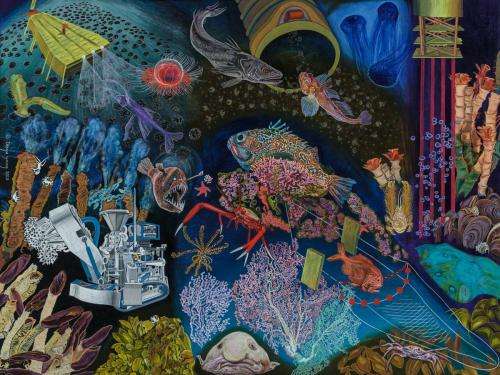With half the planet up for grabs, a call for deep-ocean stewardship

(Phys.org) —The world's deep ocean spans more than half the planet and untold quantities of untapped energy resources, precious metals, and minerals reside in its depths. Humankind needs and depends upon many of the deep ocean's treasures, and the race is already on to exploit them.
In the May 16 issue of Science, scientists from Scripps Institution of Oceanography at UC San Diego and their co-authors call for stewardship of the world's largest living space—striking a balance between wise use of vast resources and maintaining the deep ocean's delicate ecological balance—now before permanent loss occurs.
"Most of the deep ocean has never been explored. But what we have seen reveals a vast diversity of life forms and habitats important to the heath of our planet," said Lisa Levin, director of the Center for Marine Biodiversity and Conservation at Scripps Oceanography. "Slow-growing species are the norm, and some ecosystems once injured may never recover."
The deep ocean, below 200 meters (656 feet), faces mounting challenges, as impacts from activities such as fishing, oil and gas development, waste disposal, and land-based pollution have already caused long-term and possibly irreversible injury to some deep ocean environments. Industrial-scale mining looms on the horizon. Governance of the water column and the seabed below 200 meters (656 feet) is a mixed bag of regulations across national and international jurisdictions, throwing more stumbling blocks in the path to ensure the long-term health of the deep ocean.
"To advance deep-ocean stewardship," said Kathryn Mengerink, lead author of the paper, the CMBC senior fellow for environmental law and policy, and the Environmental Law Institute's Ocean Program co-director, "we need to move forward with caution, protecting and minimizing impacts to known sensitive species and areas and the vast unknown. We should invest in improving our knowledge of the deep before further exploiting its resources, so that we don't suffer irreversible loss of incredible organisms and ecosystems."
The International Seabed Authority has already developed regulations for mining exploration for the international seabed and has just started the process to develop exploitation regulations. In addition, many nations are in the process of leasing for offshore mining.
According to Mengerink, "Now is the time to carefully design laws and policies that enable wise use of mining and other resources, while maintaining healthy oceans and communities."
Given the substantial knowledge gaps, future exploitation of deep-ocean resources will inevitably be punctuated with new discoveries as well as unexpected harmful effects of planned activities. Both will require transparent and adaptive decision-making, balancing exploitation with lasting protection of habitats, biodiversity, and ecosystem services.
The ideas for this paper arose during an inaugural meeting of the Deep Ocean Stewardship Initiative (DOSI).
According to Levin, one of DOSI's founders, "The Initiative is designed to bring natural and social scientists, regulators, the private sector, and civil society together to provide guidance on environmental management of the deep ocean. We humans don't have a great track record with stewardship of land and our coastal ocean. Hopefully, we can do a better job with the deep half of the planet."
This paper is part of ELI's broader efforts to support sustainable management of the deep ocean, including its Gulf of Mexico Program to support the public's role in restoration in the wake of the Deepwater Horizon oil disaster of 2010.
The J.M. Kaplan Fund and the International Network for Scientific Investigation of deep-sea ecosystems (INDEEP) through a grant from Fondation Total have supported development of the Deep-Ocean Stewardship Initiative.
More information: "A Call for Deep-Ocean Stewardship," by K.J. Mengerink et al. Science, 2014. www.sciencemag.org/lookup/doi/ … 1126/science.1251458
Journal information: Science
Provided by Scripps Institution of Oceanography


















